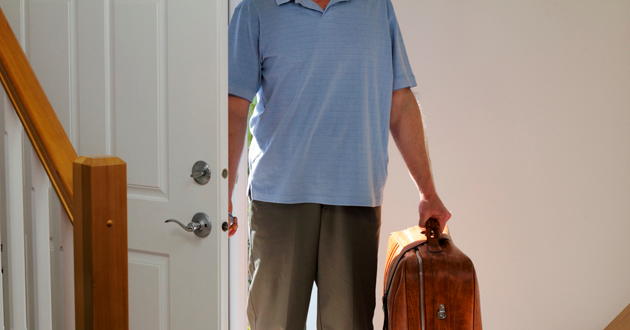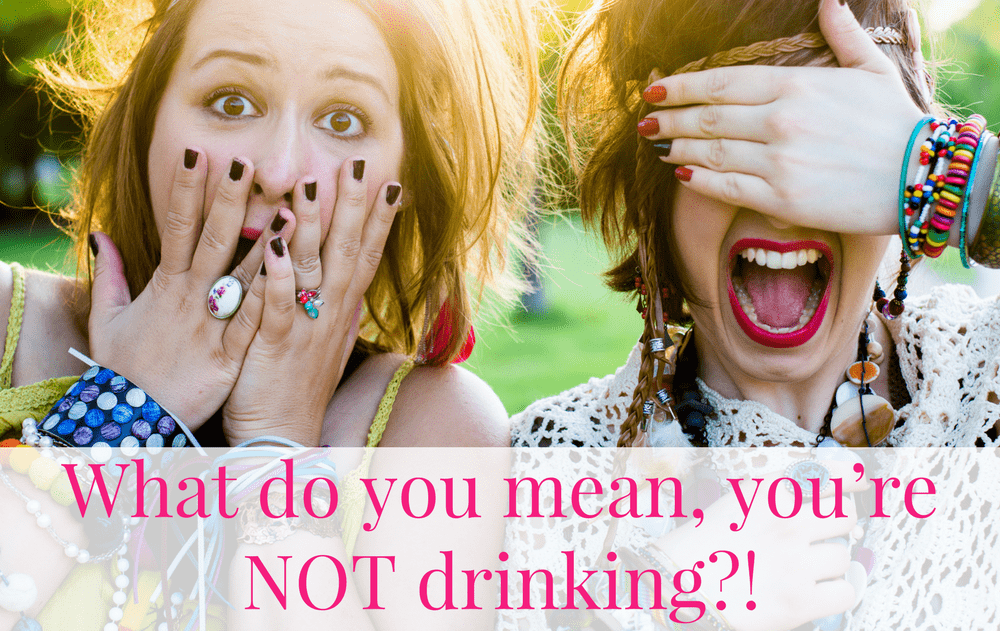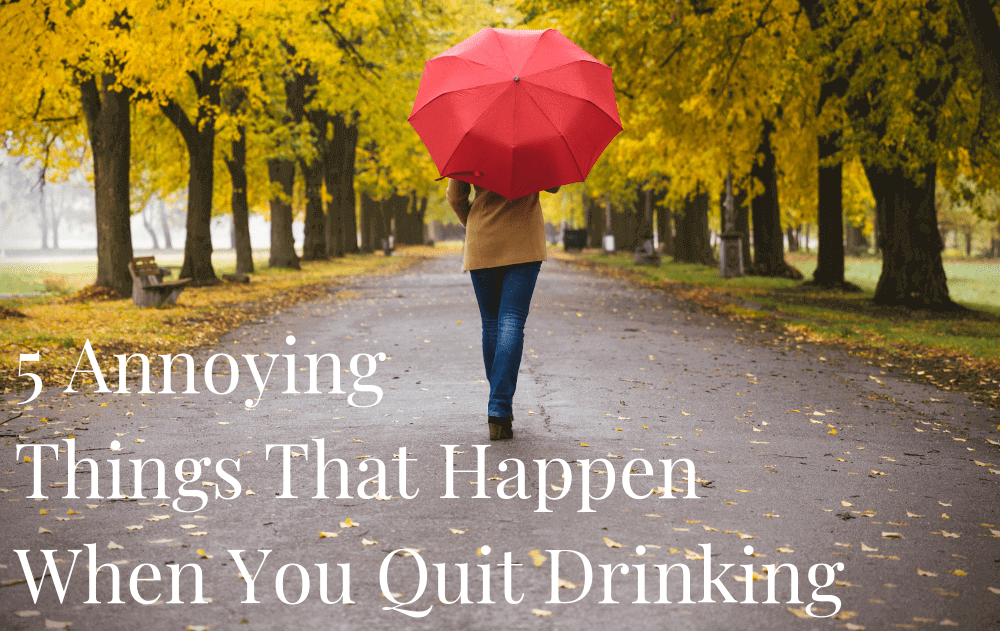Picture the scene: it’s your best friend’s birthday and you’ve been dragged out for drinks. You’re hovering near the bar, trying to discreetly order something alcohol-free without anyone noticing.
Just as you start to think you’ve got away with it, someone leans over and says, “Is that … sparkling water? Why are you drinking THAT?”
Heads turn in your direction. People frown with confusion.
Are you ill, they ask? Has something happened? Why aren’t you drinking? Why, why, WHY? What possible reason could there be for actually choosing to socialise sober *shudder*?
.
The chances are you will have to deal with some version of this scenario, at some point.
But the good news is that with a little preparation, you can stop those ‘hope-the-ground-swallows-me-up’ moments from being such a big deal. You can close down the conversation and move on (without having to tell the whole bar about your drinking history).
.
First – a big picture overview
.
It’s completely up to you what you do and don’t say.
Before we go any further, let’s take a moment to remember that it is no one else’s business whether you’re drinking or not! Other people might think they have some right to know, but they really don’t. You are in complete control here. You don’t owe anyone an explanation – not even your oldest drinking buddy. If you decided to cut out caffeine or gluten or meat, you wouldn’t seek their approval. This is exactly the same. You’re a grown up and you get to make your own decisions.
Some people genuinely won’t care.
I think you’ll be surprised how often this happens. If you’ve been obsessing about your drinking for a while, it’s easy to assume that everyone else is also obsessed. But there are lots of people out there who really don’t care whether you drink or not – even some heavy drinkers have an ‘each to their own’ attitude. And some people will just be too wrapped up in themselves to even notice what you have in your glass.
Other people’s reactions have very little to do with you.
The way people respond says an awful lot about them, and their drinking, their prejudices and their fears. But it says so little about you. It’s not something you can control, so don’t waste your energy worrying about it.
People will say stupid things.
When it comes to alcohol, most people are poorly educated. Their beliefs are based on stereotypes, myths and Facebook memes. People will say silly, clumsy things not because they’re trying to hurt you, but because they don’t know any better.
You won’t lose your real friends.
Yes, some people will be surprised by your decision and they may need a bit of time to adjust. But you’ll soon discover who your real friends are. Long term, they’re the ones who stick around and don’t care what’s in your glass, because they like you for who you really are.
How you feel about this WILL change.
Eventually, you won’t feel so bothered about this stuff. There will come a point where it feels natural and right to offer up a truthful explanation about why you’re no longer drinking. But the chances are that in early sobriety, you aren’t ready for that yet. So for now, just say whatever feels the most comfortable. Here are a few ideas.
~ Possible responses ~
For people who know you, and expect you to be drinking:
- “No thanks, I don’t feel like drinking today.”
- “No thank you – I’m taking a month off drinking and I’m loving it. I feel great!”
- “I’m doing a six week, no-alcohol challenge with some friends at work.”
- “I’ve had one too many heavy nights recently. I’m an all or nothing person and it’s time for a break.”
- “I’m driving.”
- “I’m trying to lose weight.”
- “I’m too tired.”
- “I’ve got a busy day tomorrow.”
- “I’ve been feeling run down, so I’m cutting out alcohol for a while.”
- “I’m on antibiotics.”
- “I’m training for a race.”
- “I’ve booked an early morning fitness class.”
- “I’m not feeling very well today.”
For nosy strangers:
- “I don’t drink.” (Those three little words are a complete answer.)
- “None for me thanks – but I’d really love a lime soda if you’ve got one?”
- “I just don’t like the taste.”
- “Alcohol gives me a headache.”
- “I couldn’t deal with the hangovers.”
For rude and annoying people:
- “I’m having way too much fun sober to waste my time drinking again. I feel amazing!”
- “I think I’m fabulous just the way I am, don’t you?”
- “I caught myself pestering other people to drink, and I realised I had some issues with my own alcohol intake.”
- “This is something I’m doing for myself and I don’t let other people pressure me into drinking.”
- “I care about my health way too much to drink that toxic stuff. Have you heard about the cancer risk?”
- “Sorry, didn’t you hear me? No I don’t want a drink. I’d love a sparkling water though, I find it really helps me mind my own business. Would you like one?”
.
Whatever you decide to say…
Do it with confidence. Really own it. Don’t apologise for not drinking. Never, ever be apologetic. And remember, less is more. There’s no need to say too much.
.



 Millions around the world in fact , More than 21.5 million people in the U.S alone are struggling with substance use disorders but only 10% receive the help they need. Treatment programs can help you get sober and sustain long-term recovery. For many people, the first step is attending a residential treatment program where you can get structured support through your recovery.
Millions around the world in fact , More than 21.5 million people in the U.S alone are struggling with substance use disorders but only 10% receive the help they need. Treatment programs can help you get sober and sustain long-term recovery. For many people, the first step is attending a residential treatment program where you can get structured support through your recovery.



